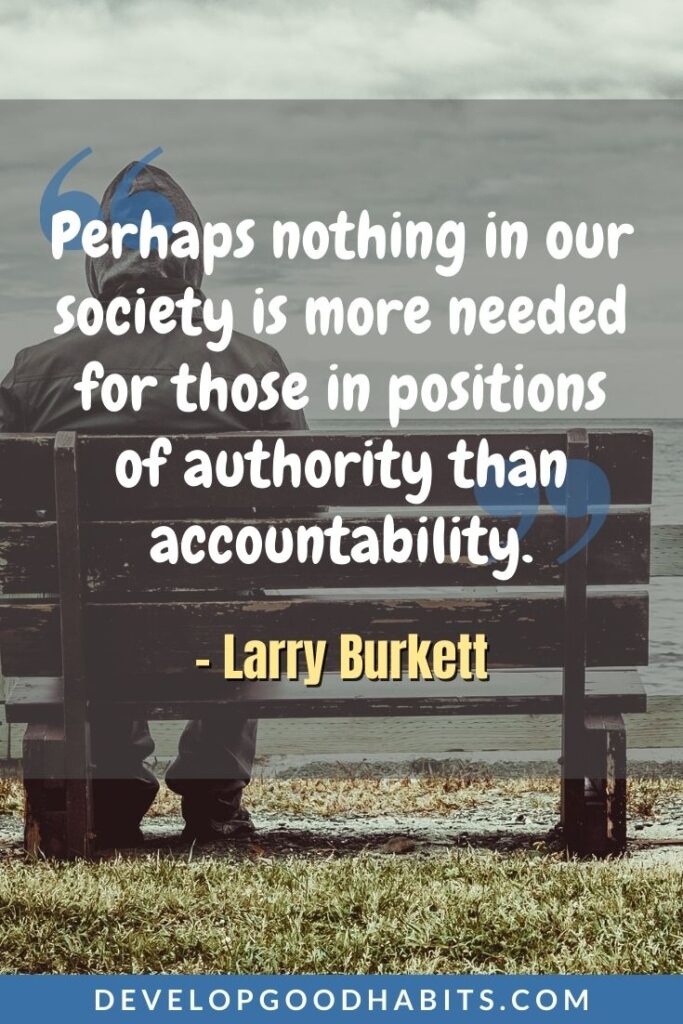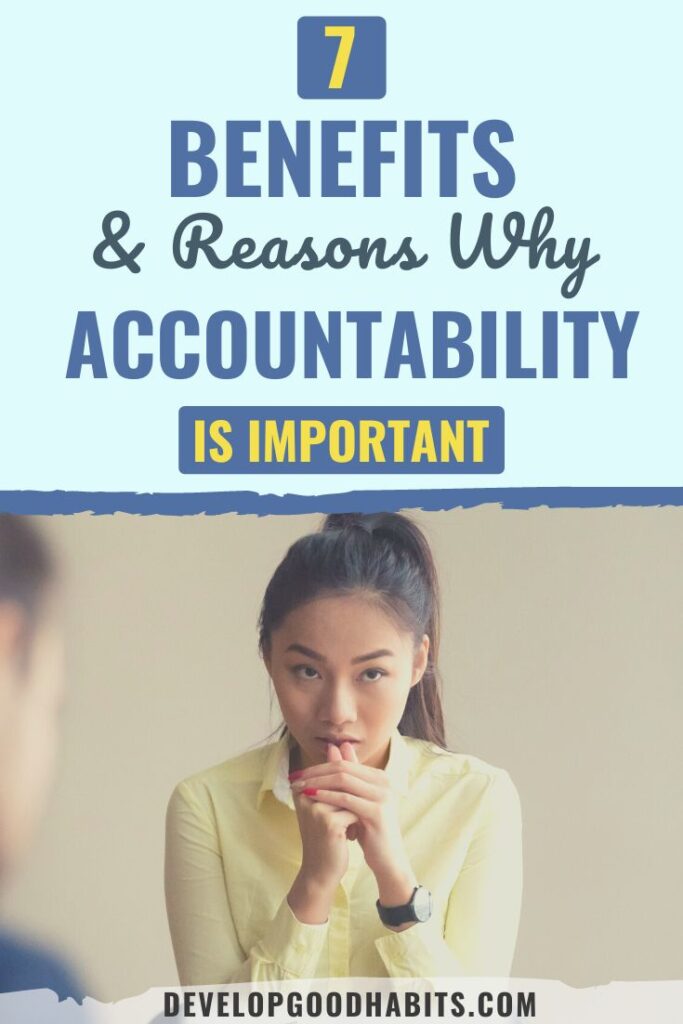The following is a sample from my book, The Accountability Manifesto: How Accountability Helps You Stick to Goals. If you're doubtful of the power of accountability benefits being able to improve your life or think that personal accountability is enough for achieving all your goals, read on to find out more…
You might think it seems like a lot of extra work to worry about accountability and interacting with others as you work on goals. Perhaps you think it’s busywork that doesn’t have value in the real world. But, as Peter Drucker once said, “what gets measured, gets managed.”
In other words, the primary accountability benefit is that you will achieve (or stick with) a goal when you receive constant feedback from others.
Beyond that, there are many other reasons why accountability has such a positive impact on personal development. Let's go over seven primary benefits.
7 Benefits of Accountability
Accountability Benefit #1: You perform better under observation.
People make better choices and perform at a higher level when they know they are being watched by others. The reasoning is simple—when you are held accountable for your actions, you will work harder.
Just think about your own life…
Odds are, you’ve probably had an exercise routine at some point. When you worked out in front of others, didn’t you push just a little harder? You knew people were watching, so you tried to look your best in front of them. You might have lifted heavier weights or ran a little faster on the treadmill.
When you worked out at home, on the other hand, it was easier to take a break or not do an extra set because no one was there to push you.
This phenomenon has been proven by hundreds of psychological tests over the course of the last sixty years.
The most famous example is the Hawthorne effect, also known as the “observer effect,” which states that you’ll probably do a better job when someone is watching you perform a task.
The term “Hawthorne effect” was coined by Henry A. Landsberger in 1950. Landsberger was analyzing experiments conducted between 1924 and 1932 at the Hawthorne Works, a Western Electric factory near Chicago.
The factory had commissioned the study to see if workers would be more productive in higher or lower levels of light.
The researchers noticed that the workers’ productivity improved when the study began and slumped when it ended.
In the end, the researchers suggested that the workers’ increase in productivity was the direct result of being under the watchful eyes of outside observers.
In the sixty years since this experiment, the same idea has been tested again-and-again, always yielding the same results—being observed while you perform an activity will help you perform better.
Remember, accountability requires two parts: internal control and external support.
Being personally responsible for your results is important, but it’s not enough to achieve peak performance. You need that external accountability to keep you on track. (Learn the key differences between accountability and responsibility in this post.)
Accountability Benefit #2: You get honest feedback from others.
Asking questions is one of the best ways to get feedback on a specific goal. Everyone views the world differently because our “lens” is tinted by our own experiences, knowledge, and education.
The things we believe are common sense are often not fully understood by others. With external accountability, you consistently have people in your life who ask: “Why is this important?” or “How does this action relate to your goal?”
Being challenged like this is a good thing because it forces you to closely examine each goal and make sure it’s your best course of action.
Accountability Benefit #3: It forces you to follow through on commitments.
We are all human, and, as such, it’s easy to make mistakes. You might start working toward a new goal and have every intention of following through with it, but rarely does that good feeling last more than a few days. You usually get sidetracked by “life” and quickly forget about continuing with your goal.
Stop to consider your own life for a moment. How many times have you set a goal, started to work on it and then quit a few days later?
From half-completed housing projects to that “extreme” exercise program advertised on television, we’ve all experienced high levels of motivation that are quickly followed by a change in attitude.
There are many reasons it’s hard to stick to a new routine; however, one of the main reasons you don’t follow through is because you lack accountability.
Accountability Benefit #4: It creates firm deadlines for important tasks.
Planning is an essential part of the goal-setting process, whether you’re talking about a new project at work, losing 10 pounds, or building an addition to your home. Without prior planning, any task is significantly more difficult to achieve.
One essential component of planning is setting firm (and public) deadlines. Sure, keeping a private timeline in your head can work, but there is a better chance you’ll follow through if you tell others about your timeline.
Not only does sharing your goals keep your feet to the fire, but it also forces you to finish projects by specific deadlines.
Check out the best worksheets on accountability that you can use for your personal goals.
Accountability Benefit #5: It keeps you grounded in reality.
Being optimistic can have a positive impact on your goals. It’s important to believe in yourself—even when nobody else does. However, there is a danger to having too much optimism. If all you do is focus on your dream, then it’s easy to forget about taking action.
Your goals are constantly reinforced with accountability. A good network of people will keep you focused on what’s important—the day-to-day tasks that often don’t seem as sexy as the end goal.
Sure, you might dream about what life will be like five years from now, but it’s far better to get feedback like this: “Stop thinking about your five-year plan. What are doing tomorrow to work on your goal?”
When looking for accountability partners, choose people who not only are encouraging but also challenging. This will keep you grounded. Their job is to help you achieve short-term goals and big goals you won’t be able to reach for several months or years.
Accountability Benefit #6: Learn from the successes and failures of others.
It’s been said that failure is often our best teacher. It’s not fun to make mistakes, but when you learn hard lessons, these experiences help you make better decisions down the road.
That said, a major benefit of accountability is the opportunity to learn important lessons without going through the painful process of making your own mistakes.
Just talking to someone, whether it be a mentor, coach, peer, or member of a mastermind group, gives you opinions and real-life experiences to help you avoid pitfalls that would cost you time, money or a combination of both.
Accountability also makes it easier to identify challenges that you might not have initially considered. Perhaps you’re too emotionally involved to predict a potential setback. It doesn’t matter what your goal is; there will always be challenges that seem to come from nowhere.
Whether it’s a snacking habit that wrecks a diet or wasting too much time on low-value business tasks, an accountability partner will often talk about what they’ve done wrong in the past and prevent you from making the same mistakes.
Speaking of learning from others, take a few minutes to watch this video about 10 famous people who have achieved success, but also experienced massive failure at one point in their lives.
Accountability Benefit #7: It prevents little problems from turning into big ones.
Little problems almost always grow into big ones unless they’re immediately addressed. Sometimes you’re blind to these little issues, and other times you might be willfully ignoring them.
Accountability partners often act as a second (even third or fourth) pair of eyes on your challenges. They are there to give you a kick in the butt to take care of any problem before it completely derails your progress toward a goal.
It may sound a bit obvious, but accountability works best when you have two people supporting each other.
To some extent, you can get accountability via social media or making public statements. But it simply does not work as well as when you have a single dedicated person to help keep you on track.
A mentor is slightly different from an accountability partner. They both try to keep you on a track to your desired success, but a mentor also has greater knowledge and experience they can share things. Often things you might not have known you didn't know.
Conversely, an accountability group can encourage you to not “sweat the small stuff.” It’s easy to get anxious whenever you encounter an obstacle, but when you talk about an issue, a good group can help you figure out what’s important to address and what can be ignored.
We all experience challenges, but participating in an accountability group gives you a chance to review your challenges and use member feedback to figure out where to focus your efforts.
Final Thoughts on the Benefits of Accountability
Accountability can bring a wide range of benefits to individuals and organizations alike.
By holding oneself or others accountable for their actions and goals, it can help foster a sense of commitment, discipline, and ownership, leading to increased productivity, efficiency, and results.
It can also improve communication, trust, and teamwork, as people work together towards a common purpose and shared goals.
By embracing accountability as a core value, individuals and organizations can cultivate a culture of excellence and continuous improvement, where people take responsibility for their actions and work towards achieving their full potential.
And if you're looking for more resources on building accountability, check out these blog posts:
- 11 Personal Accountability Worksheets for Adults & Students
- 8 Habits to Build More Personal Accountability in Your Life
- 13 Steps to Stop Making Excuses and Take Responsibility
Finally, if you want to take your goal-setting efforts to the next level, check out this FREE printable worksheet and a step-by-step process that will help you set effective SMART goals.




Thanks for the article. I’m working with a client at the moment around this topic and got blindsided today when the senior leadership team all questioned the WIIFM (what’s in it for me) of doing this. I spoke to them about the points you raised, about trust and productivity and about how awesome it can make you feel, how it saves time and builds places where people want to work. And yet they still didn’t buy it. Any thoughts on other what’s in it for me would be appreciated